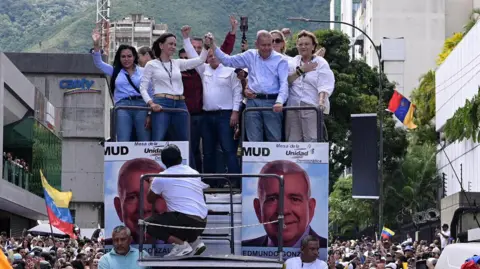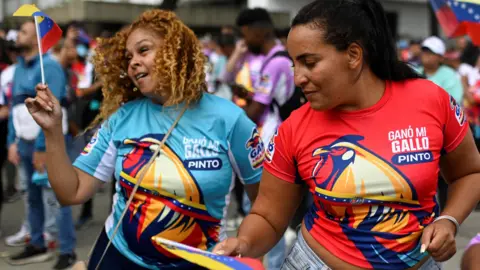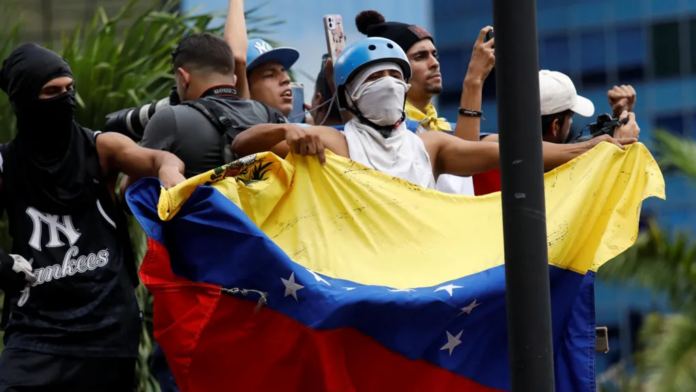Fresh protests have broken out in the Venezuelan capital Caracas after the disputed result of the country’s presidential election.
Thousands gathered in the city centre to show their opposition to President Nicolas Maduro’s claim of victory.
Many said they would not stop until there was a new government, and some said this would only be achieved if the security forces joined opposition protesters.
However, the military and police have so far remained loyal to Mr Maduro and have fired tear gas and rubber bullets at some protesters.
Local officials say around 750 people have been arrested. Two leading NGOs in the country say several people have died and dozens have been injured.
On Tuesday, Venezuela’s defence minister described the protests as “a coup”.
Surrounded by armed troops, Gen Vladimir Padrino read out a statement saying that President Nicolás Maduro had the “absolute loyalty and unconditional support” of the military.
Venezuela’s attorney general, who is a close ally of Mr Maduro, said a soldier had been killed in the anti-government protests.
Opposition leader Maria Corina Machado called for protests to be peaceful.
“We must proceed in a peaceful manner. We should not fall into the provocations the government has set us. They want to make Venezuelans face off against each other,” she said.
“Our candidate won 70% of the votes. We united a country, Venezuelans who once believed in Maduro are with us today.”
One anti-government protester, who did not want to be named because he feared repercussions from the security forces, told the BBC they had seen evidence of electoral fraud.
“We are absolutely sure the election was stolen. I worked in an electoral booth. The government is not recognising it, they stopped all the tallies of the vote halfway through the night. They don’t want the world to know that they lost,” they said.
They said that Venezuelans who had been supporters of previous leader Hugo Chavez, known as Chavistas, were now withdrawing their support from Mr Maduro.
“This is a very peaceful protest. This is an upper class part of Caracas. What we saw yesterday was quite violent. I believe the people who used to be Chavistas are no longer Chavistas,” they said.
“I think people are hoping for a change. Most likely it will be violent.”

Protest erupted after the head of the National Electoral Council (CNE) – who is a member of Mr Maduro’s party and used to work as his legal adviser – declared the president re-elected for a third consecutive term.
The CNE had earlier announced that Mr Maduro had won with 51% of the votes, ahead of Edmundo González with 44%.
However, the electoral authority has so far failed to publish detailed voting tallies, which the opposition says show that the result the CNE announced was fraudulent.
The regional body for the Americas, the Organization of American States (OAS), has accused Venezuela’s government of completely distorting the results.
The opposition coalition backing Mr González said they had been able to review 73.2% of the voting tallies and maintained that they confirmed that Mr González was the winner by a wide margin.
“We have the records showing our categorical and mathematically irreversible victory,” Mr González said.
However, on Monday the CNE doubled down, announcing that all votes hsad been counted and Mr Maduro was the winner.
Meanwhile, Attorney General Tarek Saab, a longtime ally of Mr Maduro, warned that those arrested would be charged with “resisting authority and, in the most serious cases, terrorism”.
The opposition Voluntad Popular (Popular Will) party said among those who have been detained was their national political co-ordinator, Freddy Superlano.
The party warned that the government was stepping up its repression of activists who have been demanding the publication of results from polling stations.
Julio Derbis from Petare, one of the slums on the outskirts of the city, said: “We are going to fight, we hope with the pressure from the streets, we will overturn what the president is pretending, which is him sticking to power.
“The police are our neighbours, we live side by side, and they need to understand that they need to unite in the fight for all of our common good.”
Another protester, Karina Pinto, said these protests felt different to previous rounds of anti-government demonstrations.
“We have to get on the streets, it is the only way. We don’t support violence, but they are violent. We have to respond,” she said.
“The security forces need to get on our side, they are Venezuelans too. They can’t be against us, we are the people.”

In another section of the city, groups of President Maduro’s also gathered to show their support for him.
Nancy Ramones, one supporter of the president, said: “I’m not protesting anything, I’m supporting my government, the one who won. Nicolas Maduro. And I’m supporting him because he is the man that represents peace.”
“What the opposition say, they have not proved. If they say there is fraud, they have to prove it. And fraud hasn’t happened. They always have a hidden agenda.
“This is a coup that we are not going to allow, we are patriots. We are Venezuelans, we love peace.”
Milagros Arocha said: “Here the one who really won was Nicolas Maduro, here are the people, representing Nicolas Maduro. We want peace.”
Opposition parties had united behind Mr González in an attempt to unseat President Maduro after 11 years in power, amid widespread discontent.
Almost 7.8m people have fled the economic and political crisis which has rocked the country under the Maduro Administration.
The United Nations’ human rights chief has said he is deeply concerned about the increasing tension and violence in Venezuela. Volker Turk called on the authorities to respect the rights of all Venezuelans to assemble and protest peacefully.

